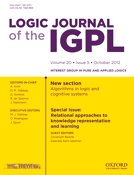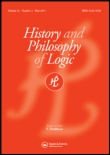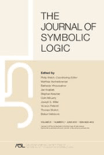
Logic and Logical Philosophy
metrics 2024
Fostering Dialogue in Logical Philosophy
Introduction
Logic and Logical Philosophy is a distinguished journal published by Nicolaus Copernicus University Torun, Poland. With its ISSN 1425-3305 and E-ISSN 2300-9802, the journal has established itself as a premier outlet for cutting-edge research in the field of philosophy, specifically focusing on the intricate intersections of logic and philosophical inquiry. Since its inception, the journal has consistently demonstrated its impact within the academic community, achieving a commendable Q1 ranking in the 2023 Arts and Humanities category, placing it in the 73rd percentile of publications in the field. The journal aims to foster scholarly dialogue and contribute significantly to the advancement of philosophical understanding through rigorous research articles, critical reviews, and discussions. With a commitment to high academic standards and accessibility—though specific access options may vary—Logic and Logical Philosophy remains an essential resource for researchers, professionals, and students alike, paving the way for innovative philosophical discourse until 2024 and beyond.
Metrics 2024
 0.45
0.45 0.60
0.60 0.60
0.60 14
14Metrics History
Rank 2024
Scopus
IF (Web Of Science)
JCI (Web Of Science)
Quartile History
Similar Journals

Analisis Filosofico
Engaging minds through open-access philosophical dialogue.Analisis Filosofico is a leading open-access journal published by SOC ARGENTINA ANALISIS FILOSOFICO, dedicated to advancing the field of philosophy. Since its inception in 2004, the journal has provided a platform for rigorous philosophical discourse and critical analysis, contributing significantly to the development of contemporary philosophical thought, particularly in the Latin American context. With an ISSN of 0326-1301 and an E-ISSN of 1851-9636, it has consistently maintained a robust presence in academic circles, as evidenced by its rank of #349 out of 806 in the Arts and Humanities Philosophy category on Scopus. The journal currently holds a commendable Q2 status in its category quartiles for 2023 and is positioned in the 56th percentile, reflecting its quality and influence among peers. Situated in Buenos Aires, Argentina, Analisis Filosofico engages with a diverse readership, encouraging scholars, professionals, and students to explore new theoretical perspectives and contribute original research. With ongoing topics converging from 2017 to 2024, this journal not only disseminates philosophical knowledge but also fosters innovative collaborations across the global scholarly community.

LOGIC JOURNAL OF THE IGPL
Advancing the Frontiers of Logic and PhilosophyLOGIC JOURNAL OF THE IGPL, published by Oxford University Press, stands as a prominent outlet for scholarly work in the field of logic and philosophy. With its ISSN 1367-0751 and E-ISSN 1368-9894, this journal has been a pivotal platform since its inception, covering critical developments in logical theory, methodology, and applications as well as fostering interdisciplinary dialogue with philosophical inquiries. The journal's impressive ranking in the 2023 Scopus metrics, placing it in the 76th percentile for Mathematics - Logic and categorized in Q2 in Philosophy, underscores its significant impact and relevance. Researchers, professionals, and students alike will benefit from its rich repository of innovative ideas and perspectives, with access options that afford a greater reach to the academic community as well as a commitment to advancing the field until 2024 and beyond. Whether you're exploring the nuances of formal systems or the implications of logic in philosophical contexts, the LOGIC JOURNAL OF THE IGPL offers essential insights that contribute to the ongoing discourse.

HISTORY AND PHILOSOPHY OF LOGIC
Unraveling the Philosophical Threads of LogicHISTORY AND PHILOSOPHY OF LOGIC is a prestigious journal published by Taylor & Francis Ltd, focusing on the intricate relationships between historical contexts and philosophical inquiries within the realm of logic. With its ISSN 0144-5340 and E-ISSN 1464-5149, the journal has established itself as a vital academic resource since its inception in 1980 and will continue to contribute to the field until 2024. It holds an impressive status, ranking in the Q1 category in History and Q2 in History and Philosophy of Science according to the 2023 category quartiles. This journal is recognized for its high-impact research, achieving notable positions in Scopus ranks, including 80th percentile in Arts and Humanities - History and 58th percentile in History and Philosophy of Science. Although it does not offer open access, it remains a crucial platform for scholars, researchers, and students aiming to explore and advance knowledge at the intersection of logic's history and its philosophical implications.

PHILOSOPHICAL STUDIES
Championing Rigorous Philosophical DiscoursePhilosophical Studies, published by Springer, is a prestigious peer-reviewed journal that stands at the forefront of philosophical discourse since its inception in 1950. With ISSN 0031-8116 and E-ISSN 1573-0883, this journal has firmly established itself as a critical platform for disseminating high-quality research in philosophy, positioned in the Q1 category for Philosophy with an impressive Scopus rank of #73 out of 806, placing it in the 90th percentile of its field. Although it does not offer Open Access, the journal’s rigorous selection process ensures that only the most relevant and impactful studies are published, making it an invaluable resource for philosophers, academics, and students alike. With a commitment to advancing philosophical inquiry and fostering a vibrant scholarly community, Philosophical Studies continues to attract contributions that challenge prevailing paradigms and explore new dimensions in philosophical thought. The journal's scope encompasses a wide array of topics within philosophy, encouraging interdisciplinary engagement and dialogue.

JOURNAL OF PHILOSOPHICAL LOGIC
Fostering Innovative Dialogue in Philosophical LogicThe JOURNAL OF PHILOSOPHICAL LOGIC, published by Springer, is a prestigious scholarly journal specializing in the intricate intersections of logic, philosophy, and their diverse applications. Since its inception in 1972, this eminent journal has become a cornerstone of philosophical discourse, attracting leading researchers and scholars in the field. With an impressive ranking of #77 out of 806 in the Scopus Arts and Humanities - Philosophy category and being positioned in the top 10th percentile, it stands as a Q1 journal, denoting its significant impact and rigorous standards in academic publishing. Although not an Open Access journal, it offers access to a wealth of high-quality articles contributing to the advancement of logical theory and practice until 2024. The journal aims to foster a vibrant platform for the exploration and development of philosophical logic, encouraging groundbreaking research and innovative dialogue among professionals and students alike, and solidifying its role as an essential resource within the philosophical community.

Reports on Mathematical Logic
Innovating Ideas at the Intersection of Logic and PhilosophyReports on Mathematical Logic is an esteemed academic journal published by Jagiellonian University’s Theoretical Computer Science Department in Poland. Focusing on the interdisciplinary realms of logic and philosophy, this journal publishes rigorous research articles that explore the foundational aspects and implications of mathematical logic in various contexts. Although it currently maintains an open access model, the journal's impact can be seen through its categorized rankings, with a Q4 in Logic and a commendable Q2 in Philosophy as of 2023. This positions it as a valuable resource for academics seeking to engage with innovative ideas and methodologies in the field. Additionally, the journal has a historical academic presence, having converged in its publication years from 2011 to 2014 and again from 2016 to 2023, underscoring its ongoing commitment to advancing knowledge in logic. With a focus on contemporary research, Reports on Mathematical Logic is essential for researchers, professionals, and students aiming to stay at the forefront of logic studies.

JOURNAL OF AUTOMATED REASONING
Fostering Excellence in Automated Reasoning MethodologiesJOURNAL OF AUTOMATED REASONING is a premier academic journal published by SPRINGER, focusing on the dynamic and evolving fields of Artificial Intelligence, Computational Theory and Mathematics, and Software. With an ISSN of 0168-7433 and E-ISSN 1573-0670, this journal ranks impressively in the second quartile (Q2) across multiple categories, reflecting its significant contribution to the advancement of knowledge in automated reasoning methodologies. Since its inception in 1985, it has served as a vital platform for researchers and professionals to share groundbreaking findings and innovative techniques, facilitating the exploration of algorithms, logical frameworks, and reasoning processes that underpin artificial intelligence systems. Although it does not currently offer Open Access options, it remains a highly regarded resource, cited widely in academia, with its impactful publications reflecting deep insights and rigorous scholarly standards. The journal’s esteemed status and its ongoing commitment to fostering a greater understanding of automated reasoning make it an invaluable asset for those dedicated to pushing the boundaries of these interdisciplinary fields.

Scientific Annals of Computer Science
Pioneering Research for a Technologically Driven FutureScientific Annals of Computer Science, published by Alexandru Ioan Cuza University of Iasi, Romania, is an esteemed open access journal that has been disseminating knowledge since 2007. With the ISSN 1843-8121 and a focus on the fields of applied mathematics and computer science, this journal supports researchers and practitioners by providing a platform for innovative ideas and substantial advancements in computational methodologies. Despite its current Q4 ranking in both Applied Mathematics and General Computer Science categories, the journal is dedicated to expanding the horizons of scientific inquiry through the convergence of theoretical and practical perspectives. Covering research from 2009 to 2024, the journal aims to elevate scholarly communication and ensure accessibility by presenting its articles free of charge, inviting contributions that can shape the future of technology and mathematics. By embracing an open access model, Scientific Annals of Computer Science aligns with the global movement towards making scientific knowledge universally accessible, thereby fostering collaboration and knowledge-sharing among researchers, professionals, and students alike.

JOURNAL OF SYMBOLIC LOGIC
Advancing Knowledge in Symbolic LogicThe JOURNAL OF SYMBOLIC LOGIC, published by Cambridge University Press, stands as a leading platform for scholarly discourse in the realms of logic and philosophy. With a rich history dating back to 1938, this esteemed journal is dedicated to presenting cutting-edge research that pushes the boundaries of knowledge within symbolic logic and its applications. In 2023, it proudly holds a distinguished Q1 ranking in both Logic and Philosophy categories, reflecting its high impact and relevance in the academic community. Researchers and academics benefit from its rigorous peer-review process and contributions from leading scholars worldwide, ensuring the dissemination of high-quality research and critical theories. While the journal currently does not operate under an open access model, it remains a pivotal resource for professionals seeking to deepen their understanding of logical theories and philosophical inquiries. Explore the JOURNAL OF SYMBOLIC LOGIC to engage with scholarly articles that challenge conventional thought and inspire future research.

Australasian Journal of Logic
Connecting disciplines through the lens of logic.The Australasian Journal of Logic is a prominent scholarly publication in the field of logic, published by the Australasian Association for Logic. With an ISSN of 1448-5052, this journal serves as a vital platform for disseminating research that advances the understanding and application of logical theory and its intersection with various disciplines. Although it is not open access, its rigorously peer-reviewed articles cater to academics, researchers, and students keen on exploring contemporary issues in logic both in theoretical and practical domains. The journal aims to foster scholarly communication and collaboration within the logic community, encouraging the exchange of ideas and insights that shape the future of logical studies. By contributing to the growing body of knowledge in this essential field, the Australasian Journal of Logic plays a crucial role in enhancing the intellectual landscape of logic research.